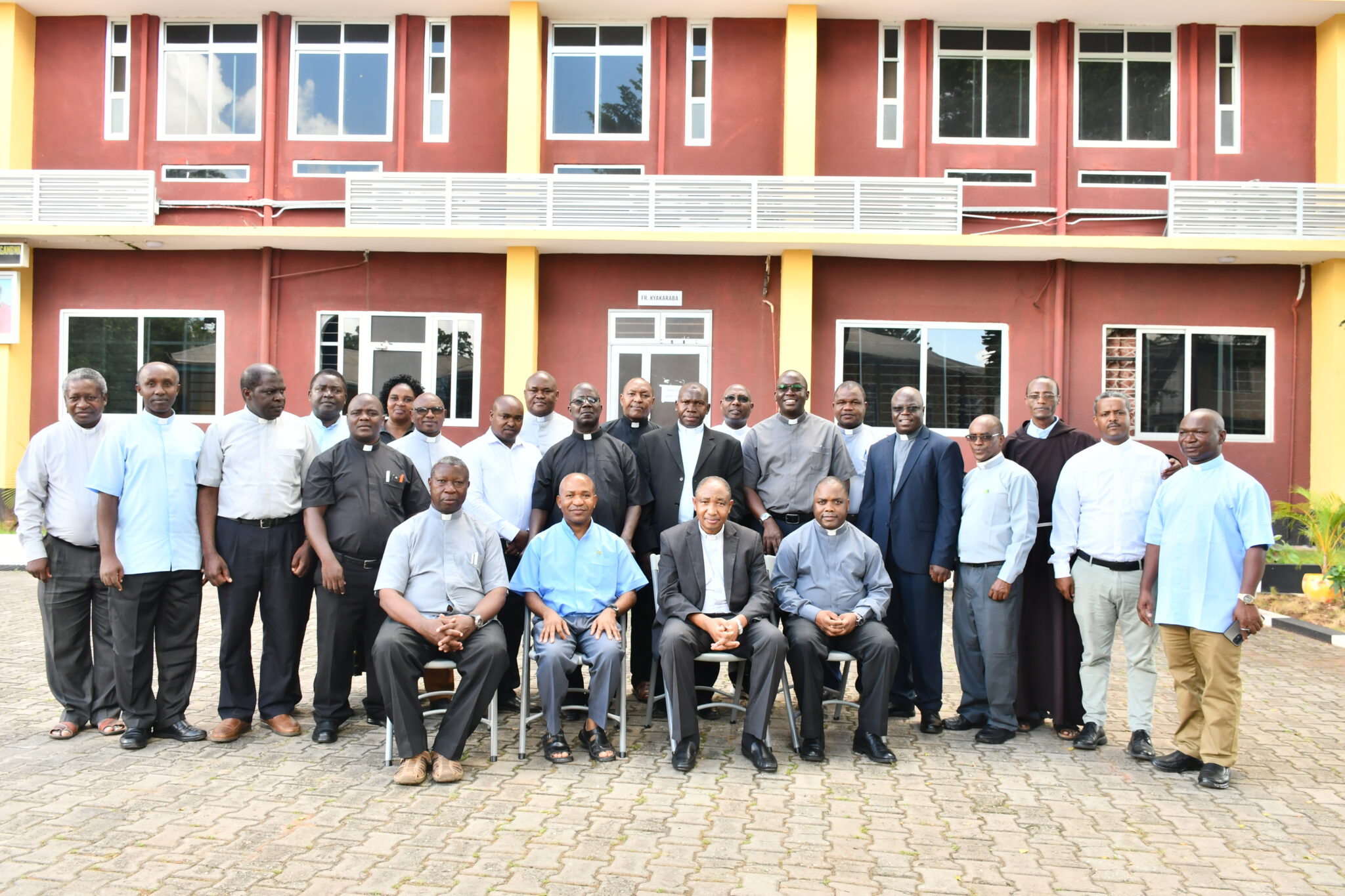
Safeguarding of children and vulnerable adults is an integral part of the Mission of the Catholic Church. In line with this, Association of Member Episcopal Conferences in East Africa AMECEA, has trained Rectors for the Major Seminaries of the AMECEA region on the protection of children and vulnerable adults. The training was held from May 23rd -27th this year at the Tanzania Episcopal Conference TEC in Dar es Salaam.
Participants have come from major seminaries of the Catholic Church from Malawi, Sudan and South Sudan, Zambia, Tanzania, Kenya and Ethiopia, with the the General Secretary of AMECEA Fr Anthony Makunde, Head of Pastoral Department AMECEA Fr Emmanuel Chimombo and Mr. George Thuku as the trainers and Paulina Wakibiru from AMECEA Head Offices Nairobi-Kenya as coordinator.
Opening the training on behalf of the TEC Secretary General, the Head of the Catechesis Department Fr. Listoni Lukoo welcomed the delegates while thanking AMECEA for coordinating the training that will bring productivity in the formation of seminarians.
“We need to reform our formation while being alert and vigilant on what is going on inside and outside the Church. There are several issues of abuse which need to be addressed especially within the Church where the minors and vulnerable adults are not safe. Even among catechists face same challenges when children come for catechetical formation. Therefore, there is a need for an honest discussion on how to safe guard children so that we may come up with a way forward as we consider the key role of the Church,” he explained.
Fr Lukoo also insisted that Child Safeguarding is not separate from priesthood formation, it is basic. The Seminarians need to know, be aware and respect the human dignity from the beginning of their formation for they are being formed to serve the people of God.
He said TEC also put much efforts on children safeguarding believing that children, young people, and vulnerable adults mostly women are a gift from God with an intrinsic right to dignity of life, respect, and security from physical, emotional, spiritual, and psychological and sexual abuse.
“However, this knowledge should begin from formators then to the seminarians so that, they are committed to ensuring that all children and adults are safe, respected, protected, and supported whilst in our care. Moreover, standards are required in institutions to avert risk,” he insisted.
On his part, the Secretary General of AMECEA Fr. Anthony Makunde explained that the purpose of the training on child care and safeguarding to Rectors/Formators of Major Seminary is to impact knowledge which, if well shared and consciously observed by the seminarians the Church, will get right products of evangelization.
further underlined that formation during 20 centuries has changed and that quite a number of things which were normal in the past are now very sensitive issues.
“You are producing many seminarians to become agents of evangelization, but what kind of products are we forming? If the products misbehave it gives pain especially to those who formed. Child protection is the concern of the world, so it is the concern of the Church,” he insisted.
Fr Makunde invited the participants to acquire knowledge through formation experiences from different countries they come from. In the discussion. He reminded them to look at good African culture and values and fuse to the seminarian formation.
“Let us not go with worldly philosophies of unlimited freedom but let us have African views in looking at the best way to protect the African child. To look at good traditions and customs that we must appreciate and develop especially in the upbringing of children and young people,” he said.
Meanwhile, AMECEA Child Safeguarding Officer Mr. George Thuku reminded the rectors that in protecting children they should also be conversant with the Church law, the law of the land and international laws. He noted that international laws and various countries’ legal frameworks recognize a child as anyone under the age of 18.
“According to the United Nations Convention on the Rights of the Child in 1990 Article 1, a child means every human being under the age of eighteen. Church Law (Canon Law) can 97§1 states that “a person who has completed the age of eighteen, has attained majority; below this age, a person is young,” he said.
The discussion of the rectors went further to identify the child in the perspective of legal, social cultural and religion perspectives. Many traditions recognize anyone who is single or un married, uncircumcised, dependent as a child or vulnerable adult while religions recognize a person who has not been baptized or initiated into the faith as a child in the faith. Those who are being brought up in priestly formation, monasticism, are also considered as children in their vocation.
The major seminary rectors also agreed that in protecting adults who need care, we must look at their basic rights which are inalienable, interconnected, indivisible and non-discriminatory.
basic human rights are not taken away, they are not asked for, they are not divided, they are necessary.
Also, in the discussions emerged on how the Church can heal a person who was subjected to abuse as well as the perpetrator while ensuring that the one who committed to offense is held legally responsible. In this regard, some of the participants insisted that the one who commits the offense undergo psychological treatment so that he or she does not continue to destroy the society.